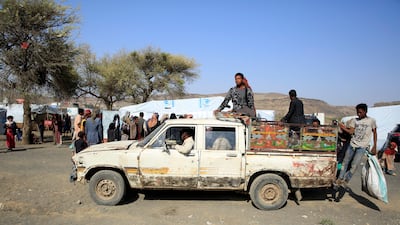The UN-brokered truce in Yemen, and its extension, provide a “real opportunity” for peace in the country despite Houthi violations in Marib, said the GCC ambassador to Yemen on Saturday.
Speaking exclusively to The National on the sidelines of the first Yemen International Forum in Stockholm, Sarhan Al Minaikher also said political peace cannot be reached while war is raging in the country.
“Political dialogue among the warring sides cannot take place except against the backdrop of a truce,” he said.
Earlier this month, Information Minister Muammar Eryani accused the Houthis of exploiting the first nationwide truce since the war began in 2015 to “catch a breath and compensate human losses in preparation for a new round [of violence]”.
This is a view shared by several current and former Yemeni officials at the forum organised by the Sanaa Centre for Strategic Studies in collaboration with the Swedish government.
“The GCC views the truce as an opportunity to bring peace and dialogue - not to buy Houthis more time. Violations committed by the Houthis in Marib are being recorded by a special team under the legitimate government — and presenting these findings to the UN.”
Mr Al Minaikher also said the government has demonstrated signs of “good faith” despite known Houthi transgressions such as issuing passports for people in areas under their control.
“The government has not stopped those travelling with Houthi-issued passports — despite this being its right as a sovereign state — because allowing people to travel abroad through Sanaa Airport for medical treatment is in the best interests of civilians.”
He also noted that the Houthis have yet to comply with some of the conditions stipulated in the truce agreement, including the reopening of roads around Taez, which would significantly ease movement for civilians.
Stabilisation aid
Mr Al Minaikher also said a Saudi-Emirati injection of over $2 billion into the Central Bank of Yemen, now based in Aden, is under way to help the country deal with continuing economic shocks.
The announcement made in April was welcomed by the US government.
“This economic support will help stabilise the economy, improve Yemenis’ access to basic services, and ease the economic crisis that causes so much suffering,” the State Department said at the time.
Mr Al Minaikher said of the transfer, “so long as the money was pledged, consider it as good as deposited.”
International and regional assistance to Yemen has been widely documented, the official said, but the Yemeni government lacks the “capacity to absorb” the incoming funds.
“They don’t have the know-how to execute plans. So, the Executive Bureau for the Acceleration of Aid Absorption handles these issues including fighting corruption and filtering development projects which deserve aid.”
“Ordinary Yemenis see the impact of this assistance on the ground but should ask themselves where the money is coming from when they travel through Aden airport, for example, which was destroyed by the Houthis and rebuilt through donor state assistance.”


